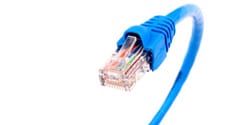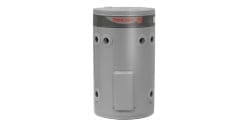Electrical safety around the home
The safety of you and your family is the most important thing there is, especially when it comes to electricity. With the increased use of technology and the upgrading of so many different household appliances, ensuring the electrics around your home are working safely and at their optimal level is a crucial safety factor for every home and workplace. So, in order to help you out we have put together a collection of electrical safety tips for your home, no matter the size or the amount of occupants. If you need any further tips or information, give your local electrician a call and they will be able to help out!
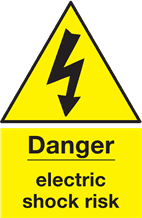

Electrical Safety Tips
To ensure your home stays safe all year round, here are a few tips and tricks we suggest for all households, big or small :
Make sure your smoke alarms work
Tip Number 1 – have working, regulation-compliant smoke alarms. With the new regulations that came into being in 2017, it is important to ensure your smoke alarms are working, legislation-compliant and appropriately located. Working smoke alarms save lives, so make sure they are working at their best every single day!
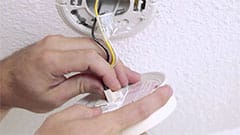

Electrical hazards need to be fixed immediately
If you find any hazards around your home, ensure they are attended to immediately. If something needs repairing or replacing, remove it from the socket as soon as you see it is damaged and let everyone know not to use it. Ensure you contact a licensed electrician to complete the repairs as soon as possible or correctly dispose of the appliance and buy a new one.
The best way to avoid electrical hazards is prevention!
Never use damaged appliances or those with exposed wires
If any of your appliances appear damaged or have exposed wires, do not use them. If it is safe, remove them from the socket and then assess whether they can be repaired by a professional or they should be thrown away. If it isn’t safe to remove them, turn your power off at the main supply and then remove them. Exposed wires anywhere in your home, including powerpoints, can be very dangerous, so handle with extreme care at all times.
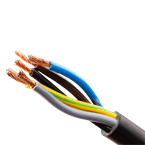

Throw away damaged or old appliances
If you are keeping any old or damaged appliances around ‘just in case’ then it’s time to throw them away. Appliances have evolved a considerable amount over the last 10-15 years, which means that a lot of devices just aren’t conducive with current electrical sockets and standards. You won’t use that 20 year toaster or 17 year old sandwich press again, as much as you’d like to think you will, so put it in the rubbish now!
Liquids and electricity do not mix
Always ensure that you keep liquids and electricity as far away from each other as possible, including :
- Only touch appliances with dry hands
- Do not place water or other liquids on the top of appliances
- Do not fill your steam kettle with water while it is still plugged in
- Do not take major appliances into the bathroom
- Do not walk into your home dripping wet if you can help it
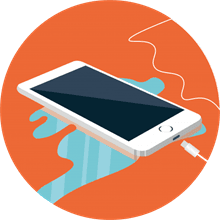

Electrical wiring on floors
Do not allow any wires or leads to ever run under the carpet or a rug, as they are a tripping hazard. Discuss with an electrician as to the best placement of wiring and leads around your home, and always ensure that they are safely stored when not being used.
Turn off appliances and electronics
Ensure all electronics and appliances in your home are turned off at the switch when not in use. Before you go to bed, make it a habit to do a quick check around your home and turn off all switches besides those being used (for example, the fridge).
Safety switches and circuit breakers
Ensure you have more than one safety switch (in accordance with legislation) and circuit breaker installed in your home and, if not, contact an electrician to complete the job ASAP.
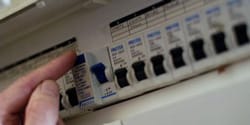

Visual checks
Take visual checks around your home of your electrics with professional help. This includes :
- Checking if your powerpoints and sockets are showing signs of damage
- Checking that all appliances not being used are turned off at the switch
- Checking that all cables and wires that are visible are in good condition and not damaged
- Checking that powerpoints and sockets are not overloaded
DIY
If you are attempting to complete an electrical DIY, take a look to see if you really should be completing the job or you should be employing an electrician. Many people injure themselves each year in DIY-related electrical accidents, so it is best to call in the professionals a large majority of the time. If you do decide to complete a job yourself, take huge amounts of care and ensure you have the appropriate tools the complete the task properly.
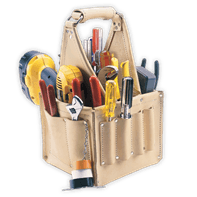

Additionally, if an appliance needs repairing do not attempt to repair it yourself. Always take it to a licensed electrician and they can fix it for you. Basically, just call a professional.
Use an electrician
As stated above, it is not advised that you complete any electrical works yourself. Always employ an electrician – they are a lot more qualified, they have the right tools and have more than likely dealt with this exact problem before, meaning they can complete the job quicker, easier and more efficiently than you can. Additionally, incorrect electrical work is not only dangerous, it can be very expensive in both the short and long term.
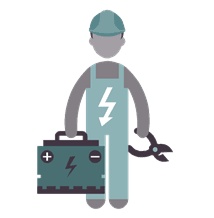

Christmas lights
The last tip is a festive one – take care when putting up and taking down your Christmas lights. Ensure you only use indoor lights inside and outdoor lights outside, and always test the lights before putting them up (as they have been in a box for almost 12 months, so they may have been damaged during that time). Always test your safety switches after installing Christmas lights and ensure you purchase Australian-made lights, as they will comply with all our appropriate legislation (lights made outside of Australia may not). These tips apply to any kind of indoor or outdoor lighting you may be erecting for an event all year round – just be very careful and get a professional to help if need be!

Your qualified electrical specialists
If you have any questions regarding electrical safety around your home, or would like one of our licensed electricians to come and take a look at your home, give us a call on 1300 911 307 or complete an online job booking form today. We offer a large range of services for all your electrical needs, so get in contact now!
Resources :
ICRA : http://www.icra2014.com/electrical-safety-tips/
Origin Energy : https://www.originenergy.com.au/for-home/electricity-and-gas/info/safety-and-outages/electrical-safety.html
BC Hydro : https://www.bchydro.com/safety-outages/electrical-safety/safety-at-home/safety-for-kids.html
Love to Know : https://safety.lovetoknow.com/Electrical_Safety_Tips_at_Home
Ovo Energy : https://www.ovoenergy.com/guides/energy-guides/the-ultimate-guide-to-electrical-safety-around-the-home.html
Electrical Safety First : https://www.ovoenergy.com/guides/energy-guides/the-ultimate-guide-to-electrical-safety-around-the-home.html

